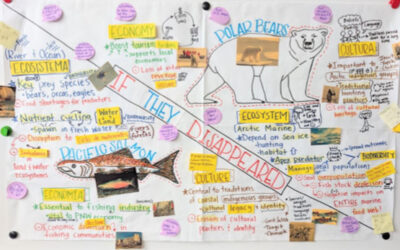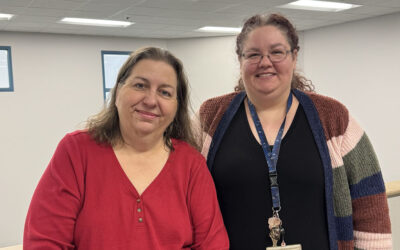Many schools in Washington State are part of the Salmon in the Classroom project. Through this program, students hatch salmon eggs at school, learn about salmon life cycle, habitat and learn how to test water quality. The hands-on experience of raising fish helps students realize that salmon are one of the many benefits of our Eastern Washington rivers.
But, how do we balance salmon, our need for hydro power and maintain a sustainable, healthy environment? That is one of the many questions that Alison Colotelo, Fisheries Biologist at Pacific Northwest National Laboratories (PNNL) researches in her work. The Columbia River is home to multiple, highly migratory species of fish, which move from freshwater to the sea and back multiple times within their lifespan. Along these migratory routes, fish must navigate around hydropower dams, which provide most of the electricity needs for the surrounding communities. This interaction provides a unique challenge to meet our electricity needs while providing safe and effective fish passage. In order to manage this interaction, researchers utilize expertise in fish biology, engineering and communications to monitor fish behavior within the river system.
In an upcoming virtual Teacher-Scientist Partnership (TSP), participants will explore methods and technologies that are used to evaluate how fish are affected by hydropower operations and explore the question; how do we balance salmon and our need for hydro power and maintain a sustainable healthy environment? The goal of the project is to support classroom teachers that have the salmon in the classroom and expand their view of the bigger system that these salmon navigate and the human needs that intersect. Participants will engage in real world activities to better understand these concepts and explore how they can be used now and in the future, as river temperatures rise due to climate change. Together as a Teacher/Scientist Partnership Alison Colotelo Fisheries Biologist at PNNL, Elizabeth (Liz) Stephens, Materials Scientists and PNNL, and Lorianne Donovan, Regional Science Coordinator at ESD 123 are in the planning stages for this amazing professional development opportunity coming soon for our Washington Educators.
The June 2022 Salmon & Hydropower TSP Planning is in full swing!
To Learn more about Alison, Liz, Lorianne, or the TSPs from the last two years, click the links below.




